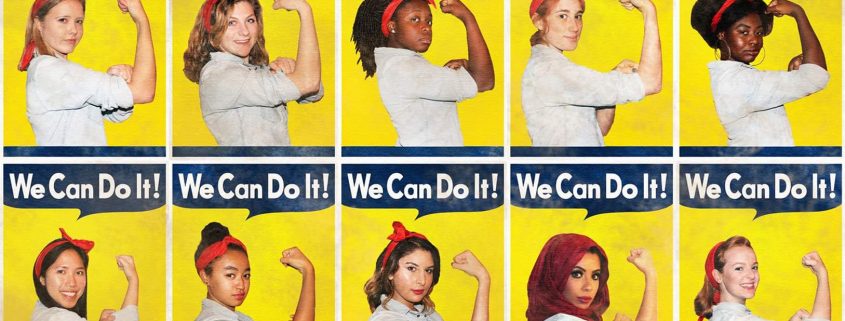Student project features feminism through images
When junior Ilana Spiegel was tasked with creating a media project at USC, she turned toward American icon Rosie the Riveter and her own desire to promote intersectional feminism for inspiration.
Spiegel has had an appreciation for the media idol since she was little, but found it difficult to identify with a powerful figure who didn’t look like her.
“I grew up with Rosie the Riveter at my house. I had a poster when I was younger. She’s always been this really great iconic figure to me that I thought was so beautiful and so strong,” Spiegel said. “Even though I absolutely loved her and what she stood for, I always did have trouble identifying with her.”
It was that disconnect that later inspired her to come up with the project. Spiegel reached out to women of different cultures and ethnicities to photograph. Each woman put on the Rosie the Riveter garb, making some modifications to express themselves.
The girls chose a label or labels that they identify as.
“Some girls were both bisexual and Christian, some girls were Jewish and atheist at the same time,” Spiegel said. “Some people did single labels, and some people did multiple labels.”
USC sophomore Joanna Izon identified herself as Nigerian.
“As a black woman, it’s been difficult for me growing up because I always wanted to conform to these ideals of beauty,” Izon told USA Today College. “This was an opportunity for me to empower myself and others who don’t fit that cookie-cutter ideal. We can all be as iconic as Rosie the Riveter even though we don’t look like she did.”
Spiegel said that she hoped the girls she photographed would be able to find Rosie inside of themselves.
“To me, Rosie represents not any sort of singular person but she represents an ideal of strength, inclusion and solidarity between women,” Spiegel said. “I think that’s really important to note right now because there’s been this concept of ‘what does it truly represent? Who does it truly represent?’ You have to embody your own version about her. That’s what I hoped the project would do help women realize there is no singular way to be a strong woman, there’s all these ways.”
That’s how the project helped inspire USC senior Shannon Delijani, who identifies as Iranian Jewish. At 6 feet 2 inches tall, Delijani is not what a typical woman is expected to look like.
“Women in general were always petite unless they were runway models, which I am definitely not,” Delijani told USA Today College. “It’s so important to be mindful of what messages we send, even with images and stories that are meant to be empowering.”
Ensuring that women of all bodies and backgrounds are all portrayed as strong, beautiful women is what the Rosie project is all about.
“The concept of sisterhood is also supportive to me, creating this supportive, loving environment, not only between Trojans and USC students, or women or women of color, but on a global scale,” Spiegel said. “Inclusion is not limited to skin color either; it’s sexuality, it’s faith, it’s political viewpoint, gender or non gender depending on how you identify. It’s about recognizing all these tiny, tiny differences and seeing what a beautiful collage they make.”
Since presenting the project, Spiegel has copyrighted the images and has been distributing them to educators upon request. Currently, she has seven elementary schools, middle schools and high schools using the Rosie project as an educational tool to promote solidarity among girls.
“It’s the greatest to show young women, particularly little girls who perhaps did not grow up with heroes that look like them, and show them that there are heroes out there that they can aspire to be,” Spiegel said. “I didn’t grow up with strong women in my media culture that looked like me, so part of this project was creating these figures and then passing them on to the younger generations so that they can see and they can identify with Rosie. They’ll say ‘Hey, I can be just as strong. Look at that. I can be Rosie too!’”

